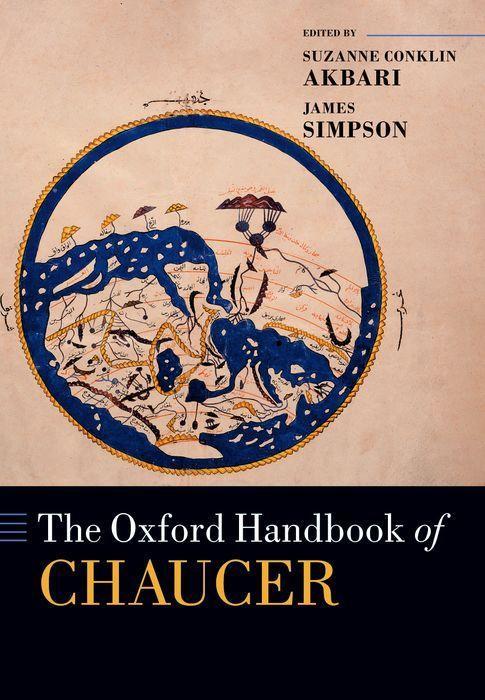This Handbook addresses Chaucer's poetry in the context of several disciplines, including late medieval philosophy and science, Mediterranean culture, comparative European literature, vernacular theology, and popular devotion.
Inhaltsverzeichnis
- Introduction: Placing the Past
- Part 1:Chaucer in the Mediterranean Frame
- 1: Peter Brown: Chaucer's Travels for the Court
- 2: Matthew Giancarlo: Chaucer and Contemporary Courts of Law and Politics: House, Law, Game
- 3: Jonathan Hsy: At Home in the 'Countour-Hous': Inhabiting Space on Chaucer's Polyglot Dwellings
- 4: Kellie Robertson: Labour and Time
- 5: Alexandra Gillespie: Books and Booklessness in Chaucer's England
- 6: Martha Rust: The Role of the Scribe: Genius of the Book
- 7: James Simpson: 'Gaufred, deere maister soverain': Chaucer and Rhetoric
- Part 2: Chaucer in the Mediterranean Frame
- 8: Steven F. Kruger: Anti-Judaism / Anti-Semitism and the Structures of Chaucerian Thought
- 9: Ruth Nisse: 'O Hebraic People!' English Jews and the Twelfth-Century Literary Scene
- 10: Karla Mallette: The Hazards of Narration: Frame-Tale Technologies and the Oriental Tale
- 11: Suzanne M. Yeager: Fictions of Espionage: Performing Pilgrim and Crusader Identities in the Age of Chaucer
- Part 3: Chaucer in the European Frame
- 12: Jamie C. Fumo: Ovid: Artistic Identity and Intertextuality
- 13: Marilynn Desmond: Chaucer and the Textualities of Troy
- 14: David F. Hult: The Romance of the Rose: Allegory and Lyric Voice
- 15: Deborah McGrady: Challenging the Patronage Paradigm: Late-Medieval Francophone Writers and the Poet-Prince Relationship
- 16: Martin Eisner: Dante and the Author of the Decameron: Love, Literature, and Authority in Boccaccio
- 17: Warren Ginsberg: Boccaccio's Early Romances
- 18: Ronald Martinez: Chaucer's Petrarch: 'enlumnyed ben they'
- 19: David L. Pike: Dante and the Medieval City: How the Dead Live
- 20: Suzanne Conklin Akbari: Historiography: Nicholas Trevet's Transnational History
- Part 4: Philosophy and Science in the Universities
- 21: Rita Copeland: Grammar and Rhetoric c. 1100-c. 1400
- 22: Fabienne Michelet and Martin Pickavé: Philosophy, Logic, and Nominalism
- 23: Eleanor Johnson: The Poetics of Trespass and Duress: Chaucer and the Fifth Inn of Court
- 24: E. Ruth Harvey: Medicine and Science in Chaucer's Day
- 25: Edith Dudley Sylla: Logic and Mathematics. The Oxford Calculators
- Part 5: Christian Doctrine and Religious Heterodoxy
- 26: Stephen E. Lahey: Wycliffism and its After-Effects
- 27: Kathryn Kerby-Fulton, Melissa Mayus, and Katie Bugyis: Anticlericalism, Inter-clerical Polemic and Theological Vernaculars
- 28: Denise Despres: Chaucer as Image-Maker
- Part 6: The Chaucerian Afterlife
- 29: Jeffrey Jerome Cohen: Geographesis, or the Afterlife of Britain in Chaucer
- 30: T. Matthew N. McCabe: Vernacular Authorship and Public Poetry: John Gower
- 31: Anthony Bale: Lydgate's Chaucer
- 32: Jonathan Newman: Dialogism in Hoccleve
- 33: Iain MacLeod Higgins: Old Books and New Beginnings North of Chaucer: Revisionary Reframings in the Kingis Quair and the Testament of Cresseid
































